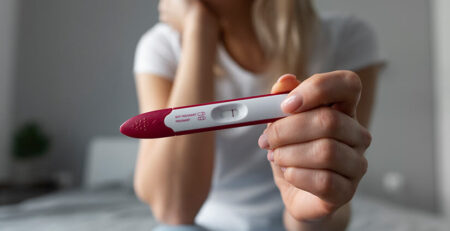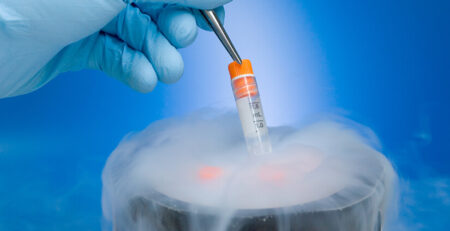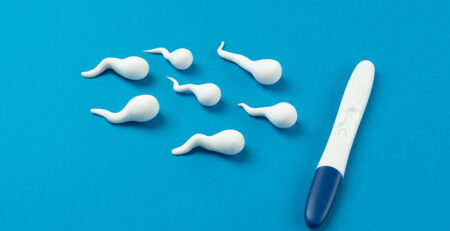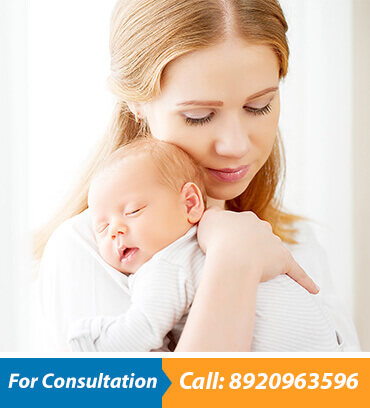Cause?
Women Egg-related factors:
Ageing & its effect on Egg reserve and quality: Regularly menstruating women produce one healthy egg every cycle but ageing not only decreases the egg reserve but also the egg quality irreversibly. This decline is rather steep after the age of 36 years.
Polycystic ovarian syndrome:
PCOS is an ovulatory dysfunction caused due to imbalance of hormones in the body wherein there are a lot of immature and small sized egg that fail to grow as in the normal process and hence the menstrual cycles are also irregular.
POI (Premature Ovarian Insufficiency):
This is when there is rapid decline in egg reserve more than the expected rate due to either genetic, immunological, drug or therapy induced factors. Here in only 10 % would have egg formation and hence chances of pregnancy rest would cease to ovulate or may attain premature menopause in due course of time.
Fallopian Tubes related:
Blockage of tube at any part prevent the pick up of egg from the ovary and transport of sperm. This can happen due to infection, inflammation, surgery, immunological factors or by birth.
Endometriosis:
This is a condition wherein the lining of the uterus grows elsewhere in the lower part of abdomen and sometimes on ovary, urinary bladder and gut. It is hormone responsive and bleeds and grows with every period. It is a progressive disease and only cessation of menses cant halt its progression. It is hence important for such women to get pregnant at the earliest as it has detrimental effect on egg quality, egg reserve, tubal structures and uterine lining receptivity also.
Fibroids:
These are non-malignant tutors of the womb. When large in size and occupying the cavity may hamper chances of getting pregnant naturally and would also affect fertility treatment results negatively
Lifestyle factors:
Fatty diet, lack of physical activity, smoking, alcohol intake, drug abuse, stress adversely affect the chances of achieving pregnancy.
Stress- physical or mental decreases the sexual drive too.
Sexually Transmitted Disease: Women & her partner are both screened for it in the initial visit and treated, as it disturbs the ascend of sperms in genital tract and affects semen quality as well.
Chemotherapy and radiotherapy adversely affect the egg reserve and sperm parameters irreversibly. For someone wanting pregnancy later, have the option of undergoing egg, sperm, embryo cryopreservation before undertaking treatment.
How to improve fertility?
Fertility management involves holistic approach, aimed at not only the specific problem but also helping couple by reducing psychological stress, improve dietary & lifestyle pattern by specific consultation.
Weight Management:
Dietary modification: Well balanced diet is important. Dietary modifications with exercise are needed to bring BMI in optimal range of 18-23 kg/m2 to ensure better outcomes. Exercise regularly: regular exercise will keep you fit and help you to maintain a healthy weight. It can also help reduce your stress levels and increase your sex drive. Stop drinking alcohol, smoking, and consumption of other recreational drugs. Do not consume any over the counter drug preparations. Folic Acid: Start taking folic acid from 1 month before conception at least till 3 months of pregnancy to prevent developmental abnormalities in baby.
When to seek help?
- If you or your partner are concerned that you have not yet conceived?
- If you are a woman under the age of 35, have you been having regular unprotected sex for a year or more without becoming pregnant?
- If you are a woman over the age of 35, have you been having regular unprotected sex for six months or more without becoming pregnant
- Are you and your partner unable to have sex on a regular basis, or at all?
- Have you had recurrent miscarriages or stillbirths?
- Have you ever had an ectopic pregnancy, appendicitis or pelvic or abdominal surgery and not getting pregnant thereafter?
- Are you having irregular, short (less than 21 days) or long (greater than 34 days) periods, or have they stopped completely?
- Have you had, or are you going to have, treatment for cancer?
- Do you have a history of polycystic ovarian syndrome, endometriosis or PID (pelvic inflammatory disease)?
- Do either of you have a history of sexually transmitted diseases?
- Do either of you have a genetic condition that you are concerned about passing on to you baby?
- If you have endometriosis and you have been trying for more than 6 months to conceive.







